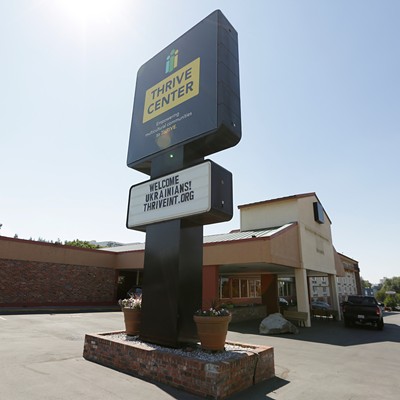News of the deaths came while Luisa Orellana-Westbrook was on a break from teaching an English class at Ferris High School. A car had been found in the river. In it were three bodies. The vehicle was just downriver from where three young Bhutanese men — refugees recently settled in Washington, one of whom was Orellana-Westbrook’s former student — were seen last month before disappearing.
Facing a class of Congolese, Tanzanians, Burmese, Bhutanese and others for whom English was not their native tongue, Orellana-Westbrook told of the grim discovery.
“Some people just sobbed. Others asked questions.
‘Why?’” she says, speaking of the immigrants in her English class that day. “Professionally, we’re not supposed to cry, but I’m human.”
The disappearance of Spokane resident Krishna Dhakal, 17 and Tukwila residents Krishna Dhital, 21 and Dilliram Bhattarai, 28, started as an eerie mystery but turned into a tragedy last week upon the discovery of the trio’s bodies. Washington’s Bhutanese community — which numbers 1,000, including 300 in Spokane — is in mourning, as are others who knew the three young men.
“This was such a big week for all of us. Not just Bhutanese, but all other groups,” says Stoja Saric, program coordinator for the English as a Second Language program at Community Colleges of Spokane. Saric left Bosnia in 1998 because of that country’s civil war, and she began working with the refugee community in town. She had also taught English to Dhakal’s parents.
“We’re relieved, in a way,” she says, because at least now there is closure.
No one seemed to know where the three men could have gone on the night of June 11. They said they’d be right back, yet never showed up.
Krishna Dhakal’s father, Bhim Dhakal, thought they may have gotten lost somewhere in Spokane. After a missing person’s report was filed on June 13, Spokane Police Detective Chet Gilmore combed the riverbank on foot, and then called in a helicopter. He checked with authorities in Canada and Idaho to see if they had crossed those borders. He put an alert on the black Acura they were last seen in, so if they were pulled over, police would know they were missing. They still didn’t turn up.
Whatever happened, they never made it far from where they were last seen. The river was high when they disappeared, and after it dropped on Wednesday, July 6, police searched the riverbank off of South Riverton Avenue, turning up a car bumper with the Acura’s license plate. A sheriff’s helicopter found the car downstream from the Mission Avenue apartment complex where Krishna Dhakal lived, and an extraction began.
By that afternoon, the area where the car had been found was cordoned off, and a team of divers from the Sheriff’s Office struggled against the murky, fast-moving water to attach hooks to the roof and body of the car. It took two tow trucks to haul the car out of the river, flip it over and place it on the bank. As a crowd of neighbors gathered — including some Bhutanese from the nearby apartment complex — the Acura emerged. It was missing its windshield and appeared to have suffered multiple impacts to its front and passenger sides. Some of the car’s windows remained intact and rolled-up. Three decomposed bodies were inside.
Identifying them took until the following Friday. A statement from the medical examiner listed their names, each with the same cause of death, “drowning in a submerged motor vehicle,” and the manner of death, “accident.”
During their investigation, police found piles of rocks disturbed along the riverbank near the intersection of South Riverton and East Sinto Avenue, says police Spokeswoman Jennifer DeRuwe, leading investigators to believe the car plunged into the river practically in front of the Dhakal family’s apartment. But how the men ended up in the river remains unknown. Lt. Brad Arleth, head of the police’s major crimes unit, says police knew from the investigation’s start that the men had been drinking the night they disappeared. Investigators noticed a beer can in the backseat of the car, but Arleth says they will have to wait for the car to fully dry before searching further.
“All we know now is that the car somehow ended up in the river,” Arleth says.
The Sunday following their discovery, the three men were cremated in Spokane. Their ashes, which if they had died in India or Nepal would be placed in the Ganges River, were instead left at the crematorium by their families, says Yug Dabadi, vice-chairman of the Bhutanese Community Resource Center in SeaTac.
The cremation marked the start of a period of mourning for the men’s parents, says Purna Sapkota, a Hindu priest who presided over the men’s cremation.
“Thirteen days [of mourning] is the way for the departed spirit to get into God,” Sapkota says through a translator.
For 13 days from that Sunday, the deceased’s parents will stay indoors, bathing every morning, and wearing white robes. They will eat once a day and won’t consume salt or oil. To ease their children’s transition into the afterlife, Sapkota says they will read the “Garuda Purana,” a Hindu holy book written in Sanskrit. After the 13 th day, the same group of Bhutanese that attended the funeral will reassemble in Spokane for a feast.
At the funeral, and lacking answers, those who knew the three men recounted their memories after the funeral.
Krishna Dhakal was smart, says Orellana- Westbrook, and he picked up English quickly. And he knew how to tweak her. Every day, the class started by writing in their journals what day of the week it was.
“With Krishna, it was always ‘today is today,’ ‘yesterday is yesterday,’” says Orellana-Westbrook. “His sense of humor was just amazing.”
For
Bhattarai’s family, their struggle is just beginning. Bhattarai, who
worked at a straw factory in Tukwila, left behind a wife and an infant
daughter, says Tanka Dhital, chairman of the Bhutanese Community
Resource Center.
The day the bodies were cremated reminds Danapati Neopaney, a friend of Dhital’s from Kent, of how he and Krishna would spend their Sundays cooking food for elderly Bhutanese in Seattle. But Dhital’s death has already changed that.
“We did not conduct that because they will miss him,” Neopaney says after the funeral.
Neopaney says his heart is heavy. Krishna Dhital was his friend, and he hoped he would be found alive.
“I am very sorry,” he says, “because I cannot save them.”





















